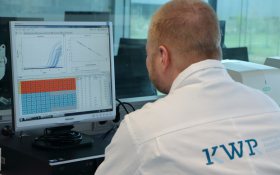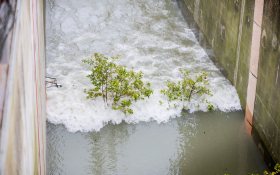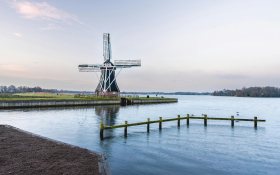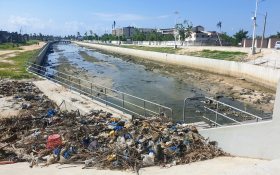Bangladesh government takes up 100-year delta plan to reduce climate risks
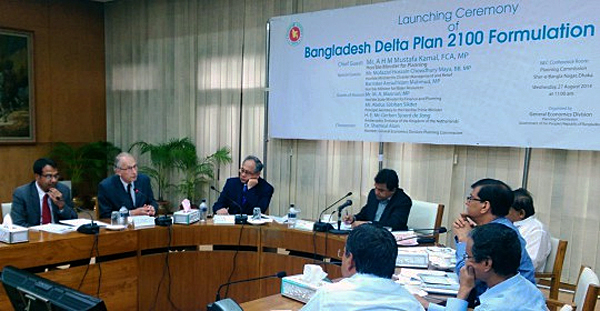
Planning Minister AHM Mustafa Kamal formally launched the Bangladesh Delta Plan Formulation Project in Dhaka on 27 August 2014.
The launching ceremony was organised by the General Economics Division of the Planning Commission of the Government of Bangladesh.
In addition to representatives of various government ministries and agencies of Bangladesh, the Government of the Netherlands, the technical assistance team supporting the formulation of the plan and other stakeholders attended the ceremony.
The Bangladesh government wants the Bangladesh Delta 2100 Plan to be ready by 2015.
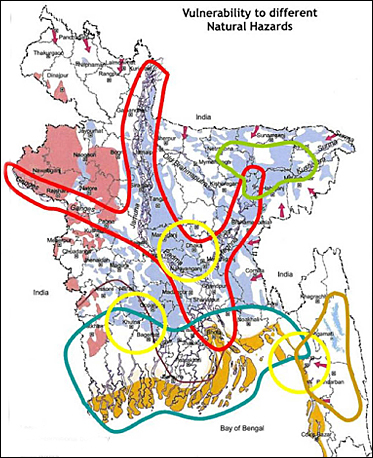 Inventory of the vulnerable areas for droughts (pink), floods (light blue), surges (yellow ochre) and hot spots related to large rivers (in red), coast (blue), urban centres (yellow), haor/wetlands (green) and hill tracts/soil erosion (yellow (ochre). source: CEGIS
Inventory of the vulnerable areas for droughts (pink), floods (light blue), surges (yellow ochre) and hot spots related to large rivers (in red), coast (blue), urban centres (yellow), haor/wetlands (green) and hill tracts/soil erosion (yellow (ochre). source: CEGIS
Mega climate adaptation project
The government has taken up a 100-year mega project to reduce climate change risks in Padma-Meghna-Jamuna floodplains and ensure water safety, food security and a sustained economic growth.
The launched project Bangladesh Delta Plan 2100 Formulation involves 19 thematic surveys on river system management, impact of climate change, disaster management, and protection of environment and livestock.
The surveys are targeted at preparing scientific vision projections for 2025, 2050 and 2100.
The General Economics Division of the Planning Ministry is implementing the project with Dutch financial and technical assistance to formulate holistic and comprehensive plans of different terms for the next 50-100 years.
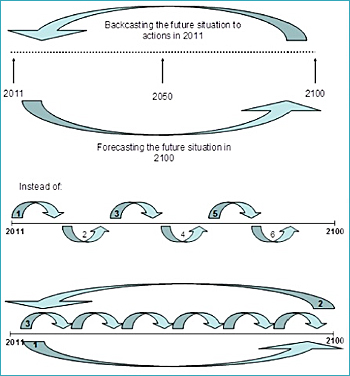 The long term vision is based on a forecast of the situation expected in 2100. By back casting it is possible to identify the necessary short term measures. Instead of a non-specific approach of trail and error - middle graphic - the delta plan offers a roadmap.
The long term vision is based on a forecast of the situation expected in 2100. By back casting it is possible to identify the necessary short term measures. Instead of a non-specific approach of trail and error - middle graphic - the delta plan offers a roadmap.
Long term vision
According to a news report by Dhaka Tribune, planning minister AHM Mustafa Kamal said Bangladesh needs an integrated approach to future land use and water management in relation to water safety and food security; governance also needs to be strengthened, integrated and focused on addressing Bangladesh’s future challenges. Kamal believes it has become imperative to develop a holistic longterm vision to optimise short-term interventions and investments to prepare for future challenges.
Keeping these views in mind, the government initiated the formulation of the Bangladesh Delta Plan 2100, he said.
The delta plan will focus on effective river dredging and river bank protection, construction of embankments, management of low lying land reclaimed from rivers, lives and assets, proper utilisation of low lying areas for lives and livelihoods, particularly in the coastal belt.
Cyclone preparedness
Disaster Management Minister Mofazzal Hossain Chowdhury Maya said because of its geo-physical location, topography and high population density Bangladesh risked recurring natural and human-induced hazards with an average 10 million people affected every year.
Describing measures so far taken by his ministry in disaster management, cyclone preparedness and relief operation, Maya said the delta plan would come up with new innovative inputs for framing successive national plans for the next 50-100 years.
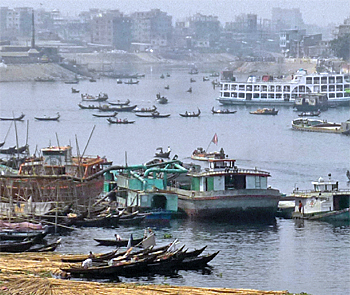 New river dredging strategy
New river dredging strategy
Water Resources Minister Anisul Islam Mahmud said: "We have already completed protection work of 265 km river bank, constructed 538 km new embankments, repaired 1,401 km embankments, built 35 bridges and culverts, excavated 366 km drainage canals and 129 km irrigation canals."
As reported by Dhaka Tribune, minister Anisul expressed hope that the studies would help cast a fresh look on the country’s river dredging strategy for augmenting their flows in dry season and maintaining navigability throughout the year. "However, questions still remain to address: Whether we should continue expensive dredging activities and at the same time refill our riverbeds with sediments settled due to low flow during dry season and soil erosion".
Dutch-lead consortium
A large international consortium, BanDuDeltAS, led by the Dutch consultancy firm Twynstra Gudde, has been assgined to formulate the Bangladesh Delta Plan 2100 (BDP2100).
The other consortium partners are Euroconsult Mott MacDonald, Ecorys, Witteveen+Bos, D.EFAC.TO, Deltares, Wageningen University, and Unesco-IHE.
At the launch ceremony Dutch Ambassador to Bangladesh Gerben Sjoerd de Jong spoke as the guest of honour while team leader of the Technical Assistant Team Jaap de Heer of Twynstra Gudde, presented the inception report on the technical assistance project.
Also read on this website
● BanDuDeltAS consortium to develop climate adaptation strategy for Bangladesh river delta, 31 October 2013
More information
BanDuDeltAS
Dhaka, Bangladesh
www.bandudeltas.org
Video by SciDev.net on climate adaptation issues in the Bangladesh village Sonatola.
